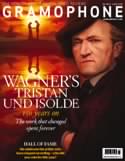Texte paru dans: / Appeared in: |
|
|
Outil de traduction (Très approximatif) |
|
|
Reviewer: Jonathan Freeman‑Attwood
The elements constituting an unforgettable Bach Passion journey are always splendidly elusive. Lindsay Kemp wrote that the Academy of Ancient Music’s recent St John Passion imparted an ‘aching kind of tragedy’ (3/14) – a notable attribute to that particular reading but arguably achieved more by the luminosity of individual performances than by a particularly unified or strong vision as we experience here.
The more substantial, theologically reflective and extended world of the St Matthew offers an equivalent of remarkable solo, choral and instrumental contributions, yet accompanied by a significantly greater range of interpretative possibility. The sinewy restlessness and foreboding in the rolling dark clouds of the opening chorus launch the work with cinematic focus. How fragrantly delicate and viscerally pointed textures seem here to match our seasoned expectations simultaneously is something of a wonder, though a few will need more convincing of the shifting tactus (eg speeding up at ‘Wohin’? and, more radically, slowing down at 4'50" on ‘Sieht ihn’). What essentially transpires is the billowing theatricality of a 17th-century oratorio, encouraged by the use of Bach’s initial and rather more austere version of 1727, a text still to be given its final polish and yet exploited fully by Richard Egarr to encourage his singers to ‘enact’ emotions freely from within the heart of the imagery. The sense of concision of this more reinedin score encourages new inflections, such as quasi-fermatas on the ties in the instrumental ritornello of ‘Buss and Reu’ (just a little gimmicky for my taste) and a wonderfully unsettling bittersweetness in ‘O Schmerz’, where, again, tempo fluctuations take the listener down unexpected paths.
If some of the numbers alight a touch breathlessly on a conceit of disquieting urgency, then the considered placement of the narrative falls to the unassuming and unforced Evangelist of James Gilchrist; his is a supremely courageous and intelligent reading whose interaction with the human volatility of Matthew Rose’s Jesus is profoundly affecting. The evolving shift from observer to ‘stakeholder’ is exceptionally skilful, especially at the point leading to Christopher Maltman’s beguilingly consoling ‘Mache dich’.
‘So ist mein Jesus nun gefangen’ is always a key gauge of how far the listener can be transported, in this case towards the metaphysical spheres of ‘Mond und Licht’, the duettists’ trajectory defined by the dreadful enormity of inevitable physical abuse. The outstanding Elizabeth Watts and Sarah Connolly have their bigger moments (the latter’s ‘Erbarme dich’ is simply unmissable) but this is a Gordian knot as yet untied for mankind and its effect is as breathtaking as Fritz Lehmann’s relevatory reading of this movement in 1949 (Music & Arts). Bach’s later appoggiaturas may not have been a good idea on this evidence. While the 1727 text is indeed interesting in its steady stream of the unfamiliar, the absence of ‘O Mensch, bewein’ to end the first half feels more of a significant loss in a reading of such uniformly outstanding achievement.
This is a small
gripe in the context of Egarr’s compellingly original vision of this greatest of
all musical tombeaus, with its fresh anticipation founded on collective
adrenaline and uniformly outstanding lyrical Bach-singing. The recorded sound is
a triumph in all its perspectives. |
|
|
|
|
|
Cliquez l'un ou l'autre
bouton pour découvrir bien d'autres critiques de CD |
|

/5060340150051.jpg)


